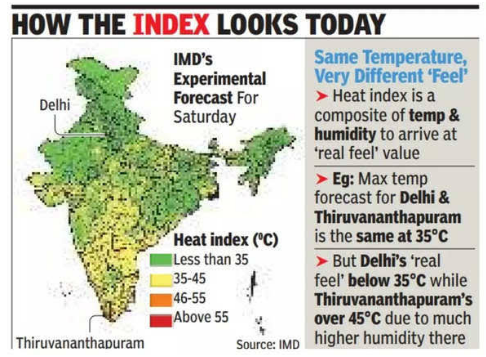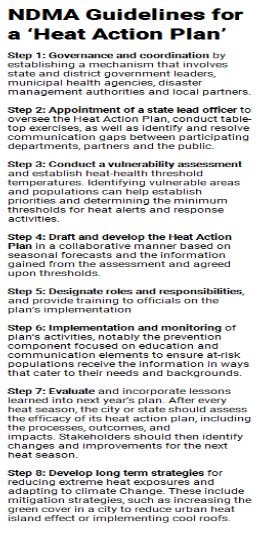Context:
- The World Meteorological Organization (WMO) released a report titled 2023 WMO Air Quality and Climate Bulletin.
- It coincides with International Day of Clean Air for blue skies, commemorated annually on 7 September in recognition of the fact that clean air is important for the health and day-to-day lives of people.
Highlights from the Report:
- Strong connection between heat waves and wildfires: Heatwaves are increasing the severity of wildfires.
- In 2022, heatwaves in the United States and Europe caused wildfires which combined with desert dust, resulted in hazardous air quality conditions.
- Increase in GHG emissions: Heatwaves contribute to additional carbon emissions increasing the concentration of greenhouse gasses(GHG) in the atmosphere.
- Desert dust: During the second half of August 2022, there was an unusually high intrusion of desert dust over the Mediterranean and Europe.
- Impact on human health and well-being: Heatwaves worsen air quality, with knock-on effects on human health, ecosystems, agriculture and indeed our daily lives
- The increase in ozone levels impacted agriculture globally, with ozone-induced crop losses averaging 4.4 per cent–12.4 per cent for staples.
- Losses for wheat and soybean were as high as 15 per cent-30 per cent in key agricultural areas of India and China.
- Increase in Marine Heatwaves: Climate change is leading to increased intensity and extensive occurrence of current marine heatwaves.
- Marine heatwaves can develop when ocean temperatures in a specific region are significantly higher than average for an extended period of time.
What is a heatwave?
- As per the World Meteorological Organization, heatwave is defined as five or more consecutive days during which the daily maximum temperature surpasses the average maximum temperature by 5 °C (9 °F) or more.
- It is a period of prolonged abnormally high surface temperatures relative to those normally expected.
- The extreme temperatures and resultant atmospheric conditions adversely affect people living in these regions as they cause physiological stress, sometimes resulting in death.
Criterion for declaring heat wave in India:
- Heat wave is considered if the maximum temperature of a station reaches at least 40°C or more for Plains and at least 30°C or more for Hilly regions.
- In coastal regions, heat waves are considered when the maximum temperature departure is 4.50°C or more from normal, provided the actual maximum temperature is 370°C or more.
Threats Posed by Extreme Heat:
- Heatstroke: Prolonged heat exposure causes heat strokes and heat exhaustion and causes various respiratory and cardiovascular diseases.
Heat Index in India:
- The India Meteorological Department (IMD) recently launched the Heat Index on an experimental basis.
- It provides general guidance for the regions within India where the apparent temperature/feel like temperature (considering the impact of humidity along with the temperature) are on the higher side causing discomfort for the people.
|
- Impact on economy: Heatwaves have an adverse impact on these workers’ productivity and thereby affect the overall economy of India.
- As per UNEP, 75 per cent of India’s workforce dependent on heat-exposed labor is in threat due to heatwaves.
- Agriculture: Prolonged heat waves adversely impact agricultural productivity and affect the livestock sector as animals are more vulnerable to heatwaves.
- As per a report by Indian Council of Agricultural Research (ICAR) titled Heat Wave 2022, heatwave falling in parallel with the developing stage of wheat, resulted in 15-25 per cent reduction in yields.
- Urban heat island effect: Due to this, buildings, roads, and infrastructure absorb heat, leading to temperatures that can be 1 to 7 degrees F hotter in urban areas than outlying areas.

- The impact is most intense during the day, but the slow release of heat from the infrastructure (or an atmospheric heat island) overnight can keep cities much hotter than surrounding areas.
Way Forward:
- Heat preparedness plans: Identifying vulnerable populations and creating heat preparedness plans with steps like opening cooling centers during periods of extreme heat and adopting workplace heat stress standards.
 Reducing the urban heat island effect: It includes installing cool and green roofs, cool pavement, planting trees to provide shade, and cooling the air through evapotranspiration.
Reducing the urban heat island effect: It includes installing cool and green roofs, cool pavement, planting trees to provide shade, and cooling the air through evapotranspiration.-
- Pursuing energy efficiency to reduce demand on the electricity grid, especially during heat waves.
- Climate Mapping for Resilience and Adaptation portal: It helps communities understand and plan for their climate risks including a real-time map of wildfire, drought, flooding, and extreme heat.
- Sendai Framework: Effective implementation of the Sendai Framework for Disaster Risk Reduction(SFDRR) 2015-30, is now the need of the hour.
- SFDRR emphasizes disaster risk reduction with the state playing a leading role and sharing responsibility with other stakeholders such as local governments and the NGO sector.
- Early Warning Systems(EWS): Installing improved EWS that communicate heatwave threats, recommend preventive measures, and predict disaster impact scenarios.
- Declaration as natural disaster: Heatwave is India’s second most lethal disaster after the flood.
- Declaring it a natural disaster will help the State and District administration prepare a heatwave action plan at the regional level.
News Source: DTE
![]() 8 Sep 2023
8 Sep 2023

 Reducing the urban heat island effect: It includes installing cool and green roofs, cool pavement, planting trees to provide shade, and cooling the air through evapotranspiration.
Reducing the urban heat island effect: It includes installing cool and green roofs, cool pavement, planting trees to provide shade, and cooling the air through evapotranspiration.